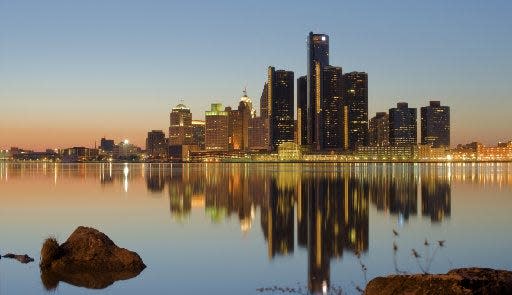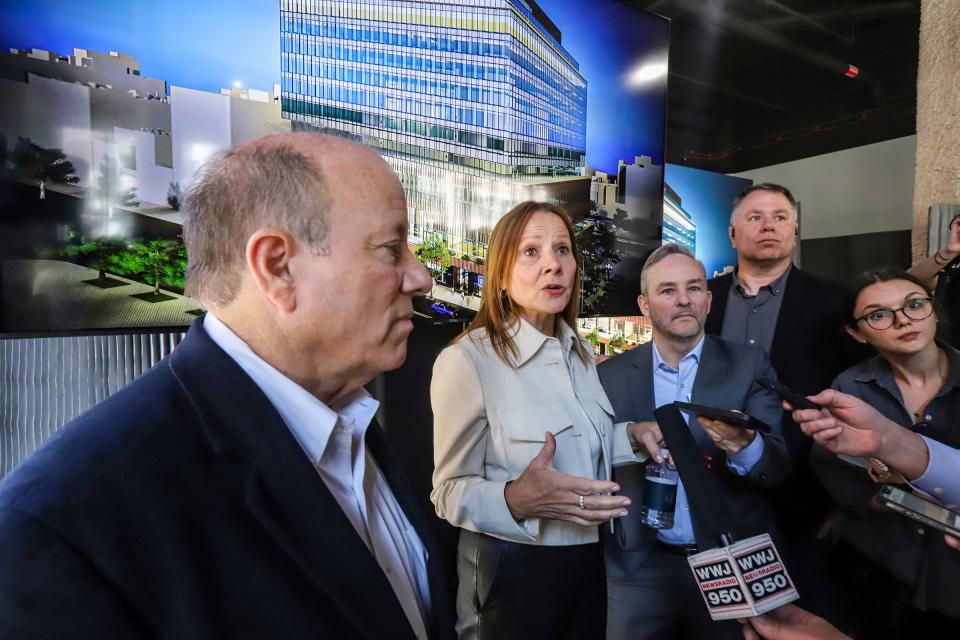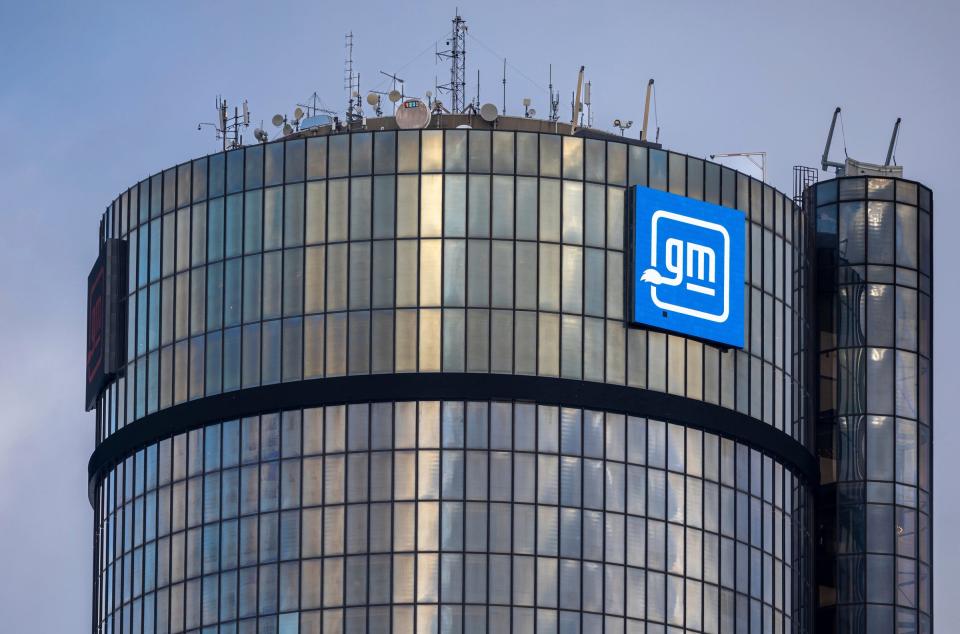Future of Detroit's Renaissance Center increasingly leans toward demolition of most towers
High-level discussions involving General Motors, Dan Gilbert's real estate company Bedrock, at least two architectural firms and construction companies on what to do with the Renaissance Center have led key decision-makers to increasingly consider at least partial demolition of the structure that has dominated Detroit’s skyline for half a century.
The discussions are preliminary, with studies underway on the best future use for the riverfront property after GM moves to Gilbert's new Hudson's Detroit building in the city's core downtown. But according to several people familiar with the matter, early thinking leans toward tearing down most of the seven towers and leaving one or two standing to preserve part of the skyline. The tower or towers left standing of Detroit's most recognizable building complex would then be renovated for new uses beyond the offices and shops it offers now, two of the people told the Detroit Free Press.

The people familiar with the discussions spoke to the Free Press on the condition they not be identified due to the sensitivity of the topic and the fact that decisions are still being made. But they said the logic behind demolition lies in the fact that the towers are an outdated design, filled with a labyrinth of corridors and glass siding that are inefficient in function. An attempt to renovate the towers into, say housing, would be expensive, difficult and almost futile.
Constructing something new on the site to replace the demolished towers would be a strong likelihood, the people said. What would go there is still up for debate.
“We want it to be a connective space between the city and the riverfront," one of the people told the Free Press. "The RenCen was built with the intention to be an island onto itself. Now we know we need that area to be a gateway to the city. So to do that, the best thing is to tear it down. People say, ‘You’ll change the whole skyline of Detroit.’ Well then, are we to leave a vacant monument just to keep the skyline?”
Gilbert's option to buy
The RenCen, which has been the focal point of the Detroit skyline since it opened in 1977, has been GM's global headquarters since the company bought five of the seven towers in 1996. But in April, GM announced it will relocate its headquarters in 2025 to Gilbert's new Hudson's Detroit building on Woodward Avenue. GM will be the anchor tenant of the building and have a 15-year lease.

According to one of the sources, GM and Bedrock have asked the state of Michigan to kick in "hundreds of millions" of dollars in economic incentives to help pay for a partial demolition, build a new structure and renovate any remaining tower or towers at the site. The governor's office did not immediately respond to a request for comment.
In a development this week, it emerged that a limited liability company linked to Bedrock has an option to buy from GM the original five RenCen towers complex, plus acres of parking lots to the east of the complex.
The deal, known as a "put-call agreement," was signed April 15 by a GM executive and Bedrock's chief executive, and gives Bedrock the right to buy the properties and GM the right to require Bedrock to buy them.
However, such a sale isn't inevitable under terms of the agreement, which can be terminated. The agreement was filed with the Wayne County Register of Deeds and first reported by Crain's Detroit.
Bedrock did not immediately provide a comment for this article. GM declined to comment, but a spokesman for Detroit Mayor Mike Duggan issued a statement Thursday about the prospect of a RenCen demolition.
"The mayor has made it clear from the beginning that all options for the Renaissance Center site will be actively explored," Duggan's spokesman John Roach said. "We are not going to have a situation as we had with the Hudson's building or Michigan Central where critical sites sat empty for 40 years because this community's leaders would not make realistic decisions. All options are being explored and no decision has been made."
In a news release GM issued on April 15 when it announced its planned move to the Hudson's Detroit building, it wrote: "The decision to explore redevelopment opportunities for the Renaissance Center site comes at a time when the office real estate market is transforming. Post-pandemic, the work environment has changed the way that office space is utilized. A recent study by CBRE indicated that 80% of current office occupiers have adopted or will adopt hybrid work. Repositioning the Renaissance Center to reflect these changes will require an experienced real estate developer like Bedrock."
The RenCen today
The RenCen had its 1977 grand opening with four 39-story office towers surrounding a central 73-story hotel, now the Marriott.
GM purchased five of the seven towers in 1996 for $73 million. GM occupies four of the towers, with the Marriott in the fifth.
The two other office towers, each 21 stories, opened in 1981. Known as Towers 500 and 600, the pair were recently sold in December by the New Jersey utility company that had owned them for years.
Tower 500 is entirely occupied by Blue Cross Blue Shield of Michigan under a recently signed 15-year lease; its new owner has not been publicly identified.
Tower 600 is said to be only about 10% occupied and owned by various investors, including Farmington Hills-based Friedman Real Estate, which also manages the tower.
The top of the RenCen, under GM's ownership, has three video display boards that GM would often light up in unique ways for special occasions, including rainbow flags in June for Pride Month. In January, during the Detroit Lions playoff run, GM added a digital lion's tail to its logo atop the RenCen.

But the weekday population in the RenCen plunged following the COVID-19 pandemic and the continued popularity of remote and hybrid work arrangements. As the Free Press first reported, in a companywide email to employees on Dec. 5 last year,GM CEO Mary Barra made it clear she wants white-collar workers at their desks inside GM facilities on Tuesday, Wednesday and Thursday of each week "at a minimum." On Jan. 8 GM's new policy kicked in and lunchtime business picked up at the RenCen with more GM employees there, at least on the days they are mandated to be in the office.
But the overall total number of people at the RenCen is believed to be lower than pre-COVID-19 counts because GM transferred some employees from Detroit to its offices in Warren in recent months. As the Free Press has reported, the lowered foot traffic has made it hard for many businesses to thrive there.
Demolition: Costly and complicated
The serious discussion around demolition of the Detroit icon should not come as a total surpise. In May, Barra hinted at it during a discussion in front of the Detroit Economic Club.
"We'll look at what's the best use for that building or that property," Barra said. "We're committed to doing the right thing. It's such prime real estate. I'm sure we're going to come up with a good solution."
Moderator Rhonda Walker, a WDIV-TV anchor, asked Barra, "Are any of the thought processes demolishing the building?"
Barra said, "We're first looking at what can be done and what would be the appropriate use for the business. We've got a year to do that so that's where we're focused."
Two of the people familiar with the current talks said there is unlikely to be an announced decision on the RenCen's fate until early next year at the soonest.
More: Bedrock buys portion of Millender Center in Detroit from GM
More: GM's move to the Hudson site in Detroit could cause a subsidies 'double dip'
For those favoring demolition, the logic behind it is simple: The RenCen is really difficult to readapt into a new function. In part, that's because it is a dated design. One of the people said the towers, with all glass around them, is not energy efficient so all the towers would need new insulation and glass, which would be "a really expensive renovation.” Plus, this person said it is like when an old house is converted to a doctor’s office, it doesn’t quite work and it is inefficient.
Granted, the cost of demolition alone would be "tens of millions" of dollars, this person said, because demolishing multiple towers at once, especially given the proximity to the Detroit River, would require intricate engineering. But it can be done, it will just be costly and complicated, the person said.
Contact Jamie L. LaReau: jlareau@freepress.com. Follow her on Twitter @jlareauan. Read more on General Motors and sign up for our autos newsletter. Become a subscriber
This article originally appeared on Detroit Free Press: Renaissance Center could see demolition of most towers

